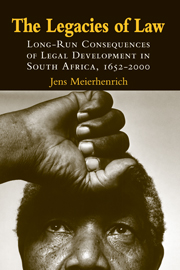Book contents
- Frontmatter
- Contents
- List of Figures
- List of Tables
- List of Cases
- Preface and Acknowledgments
- The Legacies of Law
- 1 Introduction
- PART I A THEORY OF LAW
- PART II A HISTORY OF LAW
- 4 Apartheid and the Law I
- 5 Apartheid and the Law II
- 6 Apartheid's Endgame and the Law I
- 7 Apartheid's Endgame and the Law II
- PART III A COMPARATIVE ANALYSIS
- 9 Conclusion
- Bibliography
- Index
5 - Apartheid and the Law II
Published online by Cambridge University Press: 18 December 2009
- Frontmatter
- Contents
- List of Figures
- List of Tables
- List of Cases
- Preface and Acknowledgments
- The Legacies of Law
- 1 Introduction
- PART I A THEORY OF LAW
- PART II A HISTORY OF LAW
- 4 Apartheid and the Law I
- 5 Apartheid and the Law II
- 6 Apartheid's Endgame and the Law I
- 7 Apartheid's Endgame and the Law II
- PART III A COMPARATIVE ANALYSIS
- 9 Conclusion
- Bibliography
- Index
Summary
In the previous chapter, I discussed the seven stages of state formation in South Africa, and their bearing on the evolution of the dual state. This chapter investigates the effects of the dual apartheid state. As the historical overview has demonstrated, successive governments blended legalism and coercion in South Africa, first in the making of segregation, and later in the making of apartheid. These governments used – often concurrently – reason with force, and force without reason.
A DUAL STATE
Dullah Omar, Minister of Justice in the first post-apartheid government, has described the institutional dispensation of the apartheid state as a “dual political system of a parliamentary democracy for whites and a dictatorship for blacks.” Legal scholars Kennedy and Schlossberg speak of “executive despotism” in South Africa, which they contend was exercised “side by side” with the “trappings” of parliamentary government. The following discussion traces the institutional effects of this schizophrenic institutional structure – this dual state – for politics and society.
While the normative state occasionally won out over the prerogative state in the years of segregation, the ratio of reason to force began to tilt steadily in favor of the latter when segregation became apartheid. The militarization of politics under President Botha (see discussion of Stage VII in the previous chapter) was the last, and most dramatic, stage of this transformation.
THE PREROGATIVE STATE
My analysis of the effects of the prerogative apartheid state is organized around four themes: discrimination, fear, destruction, and death.
- Type
- Chapter
- Information
- The Legacies of LawLong-Run Consequences of Legal Development in South Africa, 1652–2000, pp. 112 - 174Publisher: Cambridge University PressPrint publication year: 2008



